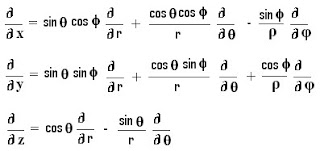Del Operator - Definition & Significance - Coordinate System.
- The collection of partial derivative operators is called DEL operator. Hence DEL can be viewed as the derivative in multi dimensional space.
- DEL operator is defined as a vector differential operator.
- A DEL operator is not a vector in itself, but when acts on a scalar function, it becomes a vector.
- Del is not simply a vector; it is a vector operator. Whereas a vector is an quantity with both a magnitude and direction, DEL does not have a precise value for either until it is allowed to operate on something.
- In Cartesian coordinate system Del operator is given as:
This operator is useful or significant in defining
- Gradient of a scalar V (∇ V)
- Divergence of a vector A (∇ . A)
- Curl of a vector A (∇ x A)
- Laplacian of a scalar V (∇2 V)
DEL OPERATOR - CYLINDRICAL CO-ORDINATE SYSTEM:
Unit vectors of Cartesian co-ordinate system are related to unit vectors of Cylindrical co-ordinate system as:
ax = aρ cosφ – aφ sinφ
ay = aρ sinφ + aφ cosφ
az =az
The differential part of x, y in terms of ρ and φ is given as:
Since the del operator is given as:
DEL OPERATOR - SPHERICAL CO-ORDINATE SYSTEM:
Unit vectors of Spherical co-ordinate system are related to unit vectors of Cartesian co-ordinate system as:
ax = sinθ cosφ ar + cosθ cosφ aθ – sinφ aφ
ay = sinθ sinφ ar + cosθ sinφ aθ + cosφ aφ
az = cosθ ar - sinθ aθ
The differential part of x, y, z in terms of r, θ and φ as:
Substituting the values, we get
ALSO READ:
- Line , Surface and Volume Intergral.
- Del Operator - Definition and Significance.
- Gradient Of a Scalar (∇ V).
- Numericals / Solved Examples - Gradient Of a Scalar.
- Divergence Of a Vector ( ∇ . A ).
- Numericals / Solved Examples - Divergence Of a Vector.
- Curl Of a Vector ( ∇ x A).
- Laplacian Of a Scalar ( ∇2 V).
Your suggestions and comments are welcome in this section. If you want to share something or if you have some stuff of your own, please do post them in the comments section.









Comments
Post a Comment